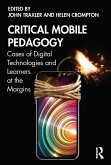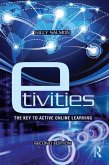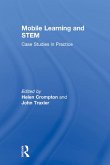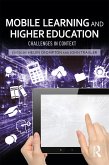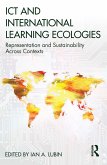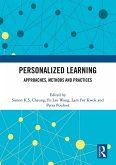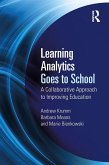Critical Mobile Pedagogy (eBook, PDF)
Cases of Digital Technologies and Learners at the Margins
Redaktion: Traxler, John; Crompton, Helen
42,95 €
42,95 €
inkl. MwSt.
Sofort per Download lieferbar

21 °P sammeln
42,95 €
Als Download kaufen

42,95 €
inkl. MwSt.
Sofort per Download lieferbar

21 °P sammeln
Jetzt verschenken
Alle Infos zum eBook verschenken
42,95 €
inkl. MwSt.
Sofort per Download lieferbar
Alle Infos zum eBook verschenken

21 °P sammeln
Critical Mobile Pedagogy (eBook, PDF)
Cases of Digital Technologies and Learners at the Margins
Redaktion: Traxler, John; Crompton, Helen
- Format: PDF
- Merkliste
- Auf die Merkliste
- Bewerten Bewerten
- Teilen
- Produkt teilen
- Produkterinnerung
- Produkterinnerung

Bitte loggen Sie sich zunächst in Ihr Kundenkonto ein oder registrieren Sie sich bei
bücher.de, um das eBook-Abo tolino select nutzen zu können.
Hier können Sie sich einloggen
Hier können Sie sich einloggen
Sie sind bereits eingeloggt. Klicken Sie auf 2. tolino select Abo, um fortzufahren.

Bitte loggen Sie sich zunächst in Ihr Kundenkonto ein oder registrieren Sie sich bei bücher.de, um das eBook-Abo tolino select nutzen zu können.
Critical Mobile Pedagogy is an exploration of mobile technologies for designing and delivering equitable and empowering education around the globe.
- Geräte: PC
- ohne Kopierschutz
- eBook Hilfe
- Größe: 6.58MB
Andere Kunden interessierten sich auch für
![Critical Mobile Pedagogy (eBook, ePUB) Critical Mobile Pedagogy (eBook, ePUB)]() Critical Mobile Pedagogy (eBook, ePUB)42,95 €
Critical Mobile Pedagogy (eBook, ePUB)42,95 €![E-tivities (eBook, PDF) E-tivities (eBook, PDF)]() Gilly SalmonE-tivities (eBook, PDF)41,95 €
Gilly SalmonE-tivities (eBook, PDF)41,95 €![Mobile Learning and STEM (eBook, PDF) Mobile Learning and STEM (eBook, PDF)]() Mobile Learning and STEM (eBook, PDF)51,95 €
Mobile Learning and STEM (eBook, PDF)51,95 €![Mobile Learning and Higher Education (eBook, PDF) Mobile Learning and Higher Education (eBook, PDF)]() Mobile Learning and Higher Education (eBook, PDF)49,95 €
Mobile Learning and Higher Education (eBook, PDF)49,95 €![ICT and International Learning Ecologies (eBook, PDF) ICT and International Learning Ecologies (eBook, PDF)]() ICT and International Learning Ecologies (eBook, PDF)40,95 €
ICT and International Learning Ecologies (eBook, PDF)40,95 €![Personalized Learning (eBook, PDF) Personalized Learning (eBook, PDF)]() Personalized Learning (eBook, PDF)40,95 €
Personalized Learning (eBook, PDF)40,95 €![Learning Analytics Goes to School (eBook, PDF) Learning Analytics Goes to School (eBook, PDF)]() Andrew KrummLearning Analytics Goes to School (eBook, PDF)37,95 €
Andrew KrummLearning Analytics Goes to School (eBook, PDF)37,95 €-
-
-
Critical Mobile Pedagogy is an exploration of mobile technologies for designing and delivering equitable and empowering education around the globe.
Dieser Download kann aus rechtlichen Gründen nur mit Rechnungsadresse in A, B, BG, CY, CZ, D, DK, EW, E, FIN, F, GR, HR, H, IRL, I, LT, L, LR, M, NL, PL, P, R, S, SLO, SK ausgeliefert werden.
Produktdetails
- Produktdetails
- Verlag: Taylor & Francis eBooks
- Seitenzahl: 244
- Erscheinungstermin: 26. November 2020
- Englisch
- ISBN-13: 9780429523694
- Artikelnr.: 60541702
- Verlag: Taylor & Francis eBooks
- Seitenzahl: 244
- Erscheinungstermin: 26. November 2020
- Englisch
- ISBN-13: 9780429523694
- Artikelnr.: 60541702
- Herstellerkennzeichnung Die Herstellerinformationen sind derzeit nicht verfügbar.
John Traxler is Professor of Digital Learning in the Education Observatory at the University of Wolverhampton, UK. He has been invited to establish a UNESCO Chair in Innovative Informal Digital Learning in Disadvantaged and Development Contexts. Helen Crompton is Associate Professor of Instructional Technology in the Department of Teaching and Learning at Old Dominion University in Norfolk, Virginia, USA. She is part of the UNESCO Chair in Innovative Digital Learning in Disadvantaged and Development Contexts.
Introduction 1. The Ju 'hoan of Nyae Nyae: a case of exclusion and Ka jan
2. Combining robust technology and gamified learning to democratize access
to growth mindset 3. Our Town: Towards creative mobile learning in
community focussed place-based education 4. Digital Inequities in Rural
Alaska 5. Mobile Device Literacy: Status and Needs of Women in Senegal 6.
Supported mobile learning in the "Third Spaces" between non-formal and
formal education for displaced people 7. Towards Participatory MOOCs 8.
Mobile information literacy and public access in the era of post-truth:
reflections from community curricular experiences in Latin America. 9.
Awakening Sleeping Languages in Saskatchewan with Culturally Appropriate
Curricula and Technology 10. Empathy-driven mobile app development (MAD)
without coding: A case of citizen developers 11. Technology-Enhanced Higher
Education for Refugees 12. Disadvantaged learners and the digital
contractor: a critical perspective on mobile learning in the Global South
with reference to Paolo Freire. 13. Mobile Learning project reports: a
contractor delivery review of three services for disadvantaged and
marginalised Global South learners 14. Post-Critical Mobile Pedagogy in
Aboriginal and Torres Strait Islander Contexts 15. Mobile Assisted Third
Space (MATS) in the margins: A tool for social justice and democracy
Conclusion: Breaking Hegemonic Structures and Conventions in Looking Toward
a Critical Mobile Pedagogy
2. Combining robust technology and gamified learning to democratize access
to growth mindset 3. Our Town: Towards creative mobile learning in
community focussed place-based education 4. Digital Inequities in Rural
Alaska 5. Mobile Device Literacy: Status and Needs of Women in Senegal 6.
Supported mobile learning in the "Third Spaces" between non-formal and
formal education for displaced people 7. Towards Participatory MOOCs 8.
Mobile information literacy and public access in the era of post-truth:
reflections from community curricular experiences in Latin America. 9.
Awakening Sleeping Languages in Saskatchewan with Culturally Appropriate
Curricula and Technology 10. Empathy-driven mobile app development (MAD)
without coding: A case of citizen developers 11. Technology-Enhanced Higher
Education for Refugees 12. Disadvantaged learners and the digital
contractor: a critical perspective on mobile learning in the Global South
with reference to Paolo Freire. 13. Mobile Learning project reports: a
contractor delivery review of three services for disadvantaged and
marginalised Global South learners 14. Post-Critical Mobile Pedagogy in
Aboriginal and Torres Strait Islander Contexts 15. Mobile Assisted Third
Space (MATS) in the margins: A tool for social justice and democracy
Conclusion: Breaking Hegemonic Structures and Conventions in Looking Toward
a Critical Mobile Pedagogy
Introduction 1. The Ju 'hoan of Nyae Nyae: a case of exclusion and Ka jan
2. Combining robust technology and gamified learning to democratize access
to growth mindset 3. Our Town: Towards creative mobile learning in
community focussed place-based education 4. Digital Inequities in Rural
Alaska 5. Mobile Device Literacy: Status and Needs of Women in Senegal 6.
Supported mobile learning in the "Third Spaces" between non-formal and
formal education for displaced people 7. Towards Participatory MOOCs 8.
Mobile information literacy and public access in the era of post-truth:
reflections from community curricular experiences in Latin America. 9.
Awakening Sleeping Languages in Saskatchewan with Culturally Appropriate
Curricula and Technology 10. Empathy-driven mobile app development (MAD)
without coding: A case of citizen developers 11. Technology-Enhanced Higher
Education for Refugees 12. Disadvantaged learners and the digital
contractor: a critical perspective on mobile learning in the Global South
with reference to Paolo Freire. 13. Mobile Learning project reports: a
contractor delivery review of three services for disadvantaged and
marginalised Global South learners 14. Post-Critical Mobile Pedagogy in
Aboriginal and Torres Strait Islander Contexts 15. Mobile Assisted Third
Space (MATS) in the margins: A tool for social justice and democracy
Conclusion: Breaking Hegemonic Structures and Conventions in Looking Toward
a Critical Mobile Pedagogy
2. Combining robust technology and gamified learning to democratize access
to growth mindset 3. Our Town: Towards creative mobile learning in
community focussed place-based education 4. Digital Inequities in Rural
Alaska 5. Mobile Device Literacy: Status and Needs of Women in Senegal 6.
Supported mobile learning in the "Third Spaces" between non-formal and
formal education for displaced people 7. Towards Participatory MOOCs 8.
Mobile information literacy and public access in the era of post-truth:
reflections from community curricular experiences in Latin America. 9.
Awakening Sleeping Languages in Saskatchewan with Culturally Appropriate
Curricula and Technology 10. Empathy-driven mobile app development (MAD)
without coding: A case of citizen developers 11. Technology-Enhanced Higher
Education for Refugees 12. Disadvantaged learners and the digital
contractor: a critical perspective on mobile learning in the Global South
with reference to Paolo Freire. 13. Mobile Learning project reports: a
contractor delivery review of three services for disadvantaged and
marginalised Global South learners 14. Post-Critical Mobile Pedagogy in
Aboriginal and Torres Strait Islander Contexts 15. Mobile Assisted Third
Space (MATS) in the margins: A tool for social justice and democracy
Conclusion: Breaking Hegemonic Structures and Conventions in Looking Toward
a Critical Mobile Pedagogy

